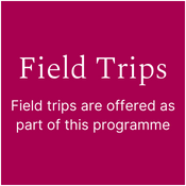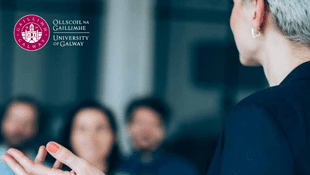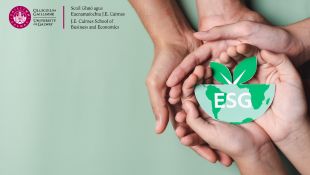-
Courses

Courses
Choosing a course is one of the most important decisions you'll ever make! View our courses and see what our students and lecturers have to say about the courses you are interested in at the links below.
-
University Life

University Life
Each year more than 4,000 choose University of Galway as their University of choice. Find out what life at University of Galway is all about here.
-
About University of Galway

About University of Galway
Since 1845, University of Galway has been sharing the highest quality teaching and research with Ireland and the world. Find out what makes our University so special – from our distinguished history to the latest news and campus developments.
-
Colleges & Schools

Colleges & Schools
University of Galway has earned international recognition as a research-led university with a commitment to top quality teaching across a range of key areas of expertise.
-
Research & Innovation

Research & Innovation
University of Galway’s vibrant research community take on some of the most pressing challenges of our times.
-
Business & Industry

Guiding Breakthrough Research at University of Galway
We explore and facilitate commercial opportunities for the research community at University of Galway, as well as facilitating industry partnership.
-
Alumni & Friends

Alumni & Friends
There are 128,000 University of Galway alumni worldwide. Stay connected to your alumni community! Join our social networks and update your details online.
-
Community Engagement

Community Engagement
At University of Galway, we believe that the best learning takes place when you apply what you learn in a real world context. That's why many of our courses include work placements or community projects.
Global Environmental Economics (MSc)
Course Overview
Do you want to contribute to address major environmental challenges? Do you have an interest in economics? Then this course is for you! It will help you to make a career out of your interests.
Many of the greatest challenges facing societies around the world today relate to environmental concerns—from climate change to food and energy security, the need to achieve sustainable and resilient forms of economic development, sustainable use of natural resources, pollution or biodiversity loss. The discipline of environmental economics is central to our understanding of these challenges and to the framing and evaluation of appropriate policy responses.
This course will equip students with the skills to address these challenges through a unique combination of theoretical and applied subjects. These are delivered through small group teaching by academics as well as industry and policy experts. This guarantees a practical focus that is further strengthened through work placements in related companies or research institutes in Ireland or abroad, including for example with the UN Climate Change and Universities Partnership Programme.
The programme is specifically targeted to provide students with employability skills that are relevant to shape and influence future public policy, conduct environmental evaluations, lead research projects, work in a business or consultancy role, with international development and aid agencies or continue education through further academic study.
The aims of the MSc in Global Environmental Economics are to equip graduates with the following skills:
- Understand and analyse global environmental issues from an economic perspective
- Critically evaluate and inform future public policy in relation to the environment
- Advanced knowledge of economic methods used to analyse environmental problems
- Understand global interlinkages of environmental problems and how these differ around the world
- Effective communication skills and be proficient with various media
Environmental Economics at the University of Galway
The MSc Global Environmental Economics is hosted by the Discipline of Economics at the University of Galway, part of the J.E. Cairnes School of Business and Economics, which is in turn one of three Schools in the College of Business, Public Policy and Law.
Throughout the programme you will mainly be engaged with academic staff of the Economics discipline. You can find staff profiles and contact details at this link: Economics Team Contact Details
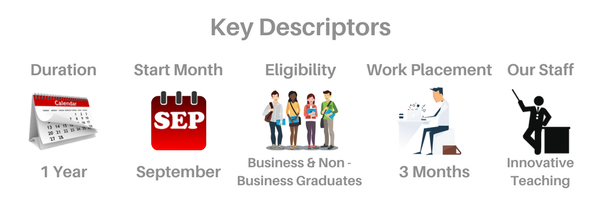
Applications and Selections
Applications are made online via the University of Galway Postgraduate Applications System.
Who Teaches this Course

SCHOOL OF BUSINESS & ECONOMICS
University of Galway
View Profile
Requirements and Assessment
Modules comprise of a combination of continuous assessment and an end-of-semester exam or purely continuous assessment. In line with employer needs, communication and presentations skills are implemented in the assessment structure.
Students have the option to undertake a work placement or dissertation during the summer semester. Students going on work placement are required to submit a Placement Report at the end of the placement, while those taking the dissertation option submit a research paper of approximately 6,000 words in length at the end of the summer semester (usually at the end of July). The dissertation usually involves close collaboration with an academic supervisor on an existing research project or on a topic chosen in discussions between the student and the supervisor.
Key Facts
Entry Requirements
Normally a H2.1 degree (NFQ Level 8 or equivalent) with Economics. However, candidates with a significantly high H2.2 honours degree and who have achieved a 2.1 average in relevant Economics modules in a business degree, will also be considered. Students without an economic background are also encouraged to apply and will be accepted subject to successful completion of an online preparatory Economics course. These students are advised to get in touch with the course coordinator as early as possible for more details. IELTS score of 6.5 or equivalent, if applicable.
Academic entry requirements standardised per country here.
English language requirements here.
Additional Requirements
Recognition of Prior Learning (RPL)
Duration
1 year (full-time); 2 years (part-time)
Next start date
September 2025
A Level Grades ()
Average intake
25
QQI/FET FETAC Entry Routes
Closing Date
Please refer to the offer rounds/closing date web-page.
NFQ level
Mode of study
ECTS weighting
Award
CAO
Course code
MSC-GEEC
Course Outline
Course Outline (Links to module descriptors available below)
(Full Time) Core Modules:
Semester 1
Microeconomic Theory
Econometrics
Natural Resource Governance and Sustainability
Climate Change Economics
Semester 2
Cost-Benefit Analysis and Evaluation
Environmental Economic Modelling
Global Issues in Agricultural, Marine and Renewable Energy Economics
And one optional module
Renewable Energy Economics
European Energy Policy
Applied Econometrics
Public Sector Economics
Green and Sustainable Finance
Derivatives and Risk Management
*Note that optional module offerings may vary from year to year
Semester 3 / Summer
Dissertation or work placement
(Part Time) Core Modules
Year 1
Semester 1
Climate Change Economics
Microeconomic Theory
Semester 2
Global Issues in Agricultural, Marine and Renewable Energy Economics
And one optional module
Optional modules (offered in 2023/24*)
Derivatives and Risk Management
Social Marketing & Environmental Sustainability
Public Sector Economics
Green and Sustainable Finance
Data Analytics for Social Sciences I
Data Analytics for Social Sciences II
Renewable Energy Economics and Policy
*Note that optional module offerings may vary from year to year
Year 2
Semester 1
Natural Resource Governance & Sustainability
Econometrics
Semester 2
Cost Benefit Analysis & Evaluation
Environmental Economic Modelling
Semester 3 (Summer)
Applied Environmental Economics Placement*
Dissertation
*We will secure internship opportunities, but it is at the discretion of employers as to whether they shortlist and offer a position to applicants.
Click Here: Module details for Full-Time option
Click Here: Module details for Part-Time option
Why Choose This Course?
Career Opportunities
Future employment
Graduates have found employment in international development and aid agencies, the European Commission, utility companies, government departments, investment banks, corporate environmental investment funds, United Nations organisations, consultancy firms and local authorities, and many of our graduates have gone to undertake PhDs.
Graduate Employers include: Department of Communications, Climate Action and Environment (DCCAE) Marine Institute, Galway County Council, Environmental Protection Agency (EPA), Sustainable Energy Authority of Ireland (SEAI), The Economic and Social Research Institute (ESRI), Bord na Mona, Coillte, Teagasc, Environment Agency (UK), Electricity Supply Board (ESB), Bord Iascaigh Mhara.
Partnership with United Nations (UN) on Climate Change Adaptation
The MSc Global Environmental Economics at the University of Galway has recently partnered with the UN Climate Change and Universities Partnership Programme. The Partnership offers opportunities for graduate students to work closely with local, national, and regional partners and international experts to carry out research projects aimed at addressing identified knowledge gaps related to the challenges of adapting to climate change.
Students from the MSc Global Environmental Economics class of 2022-23 are currently working on a project developing a better understanding of the limits to ecosystem-based adaptation (EbA) for coastal flood risk in the Pacific Islands. The project will form the basis of the students’ Masters Dissertations, and is supervised by Dr Thomas K.J. McDermott, programme director. The UN Partnership programme is part of the Nairobi work programme: The UNFCCC Knowledge-to-Action Hub for Climate Adaptation and Resilience.
Field Trips
Field trips are offered as part of this programme, below are the field trips that students from the class of 2022-23 got to participate in:
RV Tom Crean
The seagoing training for the programme is held in Cork, Ireland each year on board the RV Tom Crean. This training provide students with invaluable skills for future employment, as it involves students responding to a virtual company request to conduct a cost benefit analysis for a new environmental project.
This training is a collaboration between the Strategic Marine Alliance for Research and Training and the Social and Economic Marine Research Unit (SEMRU) at the University of Galway. This is a unique opportunity for students to experience the multidisciplinary scientific research methods used to survey the marine environment through the core disciplines of oceanography, fisheries biology, benthic ecology and geosciences.
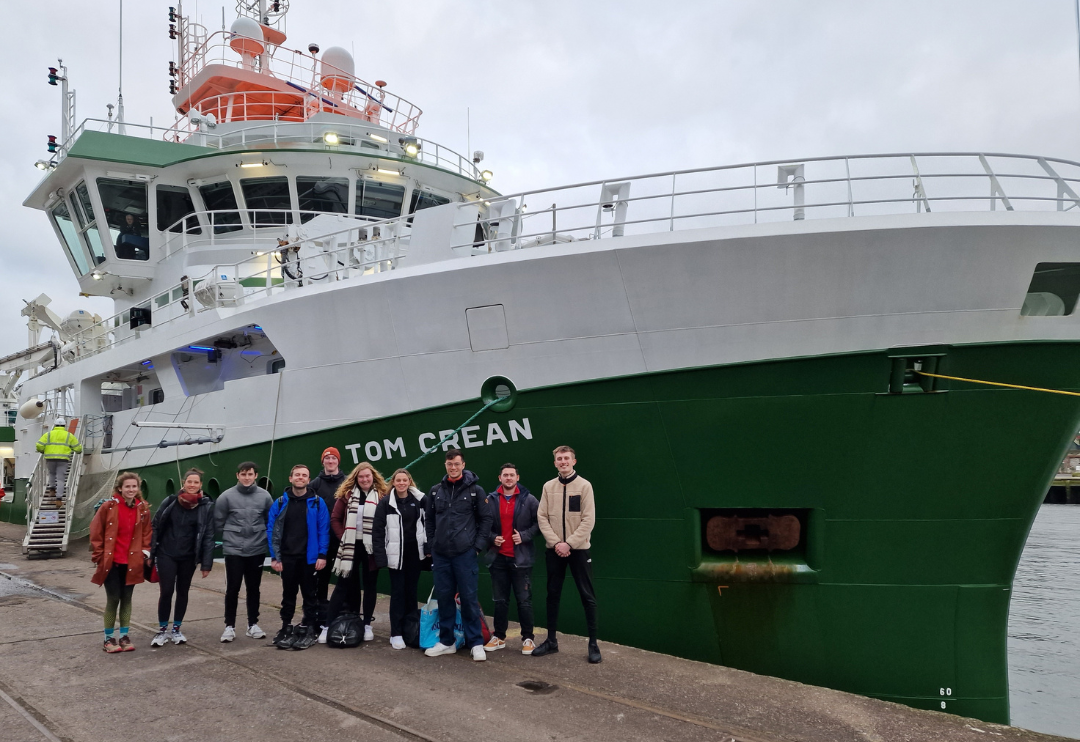
Visit to the UNFCCC headquarters in Bonn
Three students from last year’s MSc class, Alfred Afeku, Brenda Daly and Jack Flannery (cc’d), worked on a research project over the summer in partnership with the UNFCCC. Brenda and Alfred recently visited the UNFCCC headquarters in Bonn. For more information see: blog post, UN University of Galway Partnership Student Report.
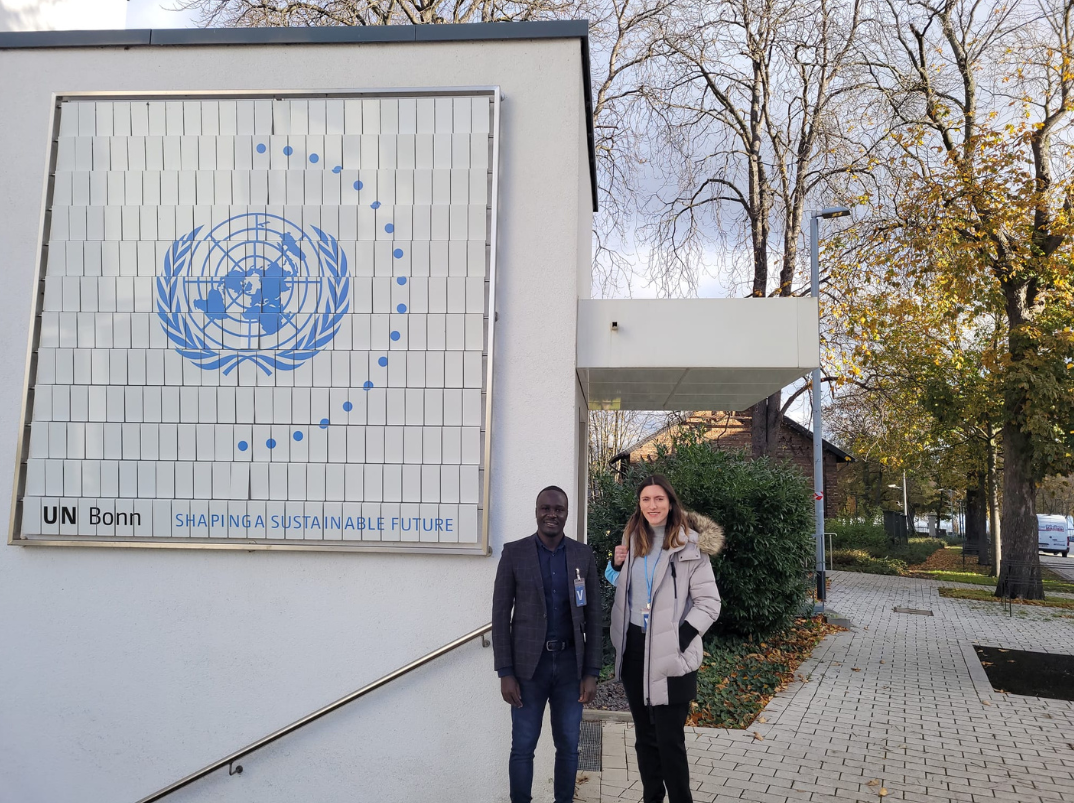
Trip to Brussels
A group of our students visited SolarPower Europe and a number of other environmental companies during a trip to Brussels and gained first-hand insights into their work.
Our students best described the filed trip:
"The field trip was completely eye-opening to the vast number of opportunities available in Europe in the field of Environmental Economics. It was a great experience to learn from those who work within the European Commission and from the organisations that help the commission make their decisions on EU energy policy. After a year of hard work, it was really rewarding to hear from everyone we met that our skills were highly demanded. Coming home from this trip I was excited and eager to start my career in Environmental Economics." Emily Muldoon.
.png)
Research Expertise
Economics at the University of Galway has a long and proud tradition of engaging with environmental issues, both through our teaching and research. The MSc in Global Environmental Economics was introduced in 2018, replacing the previous MSc in Natural Resource Economics and Governance.
Environmental Economics represents one of the core areas of research focus within Economics at the University of Galway, and this is reflected in the presence of two highly active research groups in the area of environmental economics:
The Centre for Economic Research on Inclusivity and Sustainability (CERIS):
The CERIS Mission is to conduct high-quality economic research that helps develop a more inclusive society and sustainable environment, ensuring a better future for all. We aim to better understand individual behaviour and policy decisions, from the local to the global scale.
The Socio-Economic Marine Research Unit (SEMRU):
SEMRU is the foremost marine economic analysis centre in Ireland. SEMRU was established with the objective of expanding marine socio-economic research capability in Ireland, centred around a research cluster in Galway led by the University of Galway and linking with Teagasc and the Marine Institute.
Climate Resilient Places Reserach Project
Climate Resilient Places (CRePs) is a two-year research project, funded by the Environmental Protection Agency (EPA) and the Department of Transport. The project is led by researchers at the Centre for Economic Research on Inclusivity and Sustainability (CERIS) and involves interdisciplinary collaboration between economists, engineers and psychologists at the University of Galway. The project directly addresses a number of the UN’s Sustainable Development Goals. Read more: Climate Resilient Places Project
Niamh Burke Renewable Energy Bursary - Arthur Cox/ IWEA
The bursary is open to students wishing to study in the renewable energy field in Ireland, at Postgraduate level. All relevant disciplines are open for application - law, economics, engineering, modelling, policy and others. The closing date is the 6th of March. Apply here.
Who’s Suited to This Course
The course is suited to individuals from multiple backgrounds who are interested in pursuing a new career in Global Environmental Economics or in incorporating the tools of Environmental Economics into their current career pathway. The course will suit recent graduates in Economics, Business, and the Social Sciences who have studied Economics.
Learning Outcomes
Transferable Skills Employers Value
Work Placement
This programme guarantees a practical focus that is further strengthened through work placements in related companies or research institutes in Ireland or abroad. Placement partners include: Marine Institute, BIM, Tipperary Energy Agency, SEAI, Irish Wind Energy Agency (IWEA), Coillte, Teagasc, ESB, ESRI, IGEES, AIB, Ernst & Young, Comreg.
Study Abroad
Related Student Organisations
Course Fees
Fees: EU
Fees: Tuition
Fees: Student levy
Fees: Non EU
For 25/26 entrants, where the course duration is greater than 1 year, there is an inflationary increase approved of 3.4% per annum for continuing years fees.
Postgraduate students in receipt of a SUSI grant – please note an F4 grant is where SUSI will pay €4,000 towards your tuition (2025/26). You will be liable for the remainder of the total fee. A P1 grant is where SUSI will pay tuition up to a maximum of €6,270. SUSI will not cover the student levy of €140.
Note to non-EU students: learn about the 24-month Stayback Visa here.
Find out More
What Our Students Say
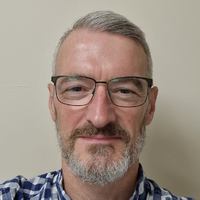
Myles McDonagh | Managing Director, Silvalytics
In 2021/2022 I studied the MSc in Global Environmental Economics taking the two-year, part-time option. I found it really worthwhile and enjoyable. The effort of fitting the coursework and study around my other responsibilities was certainly an extra effort, but manageable. At the time I already worked in the area of economic development assistance but I really found the course strengthened my understanding of global environmental issues and the theory and tools that are applicable in this area. The course itself is very well designed and reflects very closely the skills that are needed to address global environmental issues (and sought by employers). The teaching staff are passionate about their topic areas and I found the standard of tuition to be high with lots of effort made to engage students and present them with varied case studies, group work and simulations of real world tasks. Effectively communicating these sometimes complex issues was emphasised and practiced which, together with friendly classmates from a variety of backgrounds, made for enjoyable class time.
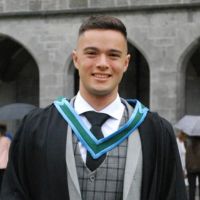
Patrick Wing McHale | Current PhD student
I completed my MSc in Global Environmental Economics with first-class honours (1.1). It has been an utterly enjoyable experience and I cannot recommend this course enough to anyone with a passion for current environmental issues. Throughout the MSc students are exposed to the latest issues in environmental ecnonomics, such as integrated climate change models, European energy policy, as well as the skills and knowhow to perform economic analysis. I was delighted to befriend many from all walks of life that share in my enthusiasm for environmental protection. I would like to personally thank Dr Tom McDermott, Dr Matthew Collins, Dr Tom Gillespie, and Dr Enda Hargaden, among many others, for their ceaseless support and advice throughout, and after, the programme, and for inspiring me to pursue a career in impactful economic research.
What Our Graduates Say

Meaghan Tierney | Economist at FERC
My interest in economics, public policy, and the environment is what led me to pursue an MSc in Global Environmental Economics, and I am pleased to say that it more than fulfilled my expectations. The course includes a variety of different classes all of which have a central focus on environmental issues and solutions. Some classes such as Econometrics and Microeconomic Theory are heavily quantitative while others such as Public Sector Economics and Natural Resource Governance & Sustainability are based more in theory and qualitative evidence. I appreciated all the group work throughout the year as it enabled me to make great friends with classmates and prepared me for the working world. The opportunity to complete a work placement whilst completing the dissertation requirement is unique and has been a great experience. I wholeheartedly recommend this course- while studying an exceedingly important subject, you can enjoy the University of Galway and the city as a whole. I am grateful for the knowledge and experiences I gained while completing this MSc.
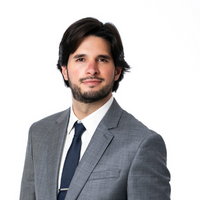
Juan Pablo Martinez | Responsible Investing Team at Irish Life Investment Managers
As someone with a longtime passion in sustainability who was seeking to have a much more focused impact on the fight against climate change, I found the MSc in Global Environmental Economics at University of Galway to be the ideal course for anyone who wants the necessary skills and proficiency to meaningfully influence policy in order to solve the most pressing environmental issues. This is certainly a challenging course—as it is heavy on numbers and analysis—however, the benefits of this course have been massive as shortly after graduating I went on to join the recently formed Responsible Investing Team at Irish Life Investment Managers and have been developing in the fields of Sustainable Finance and ESG, which I’ve found incredibly rewarding. Many of my classmates went on to have highly varied and interesting roles in renewable energy, public policy, agricultural tech, environmental consultancy and so much more. Major opportunities are emerging globally in roles related to environmental economics and this course provides the right skillset to embrace them.
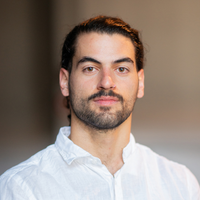
Daniel Vila | Market Analyst STOFF2 GmbH
I cannot speak highly enough about my time studying Global Environmental Economics at University of Galway. The breadth of courses and experienced lecturers provided me with a great opportunity to further develop techniques in quantitative research that I routinely use in my current position as a researcher in the field of renewable energy technology. My time there opened many doors for me; if you are interested in studying the effects of agriculture, health, and/or renewable energy policy (and their dynamic interaction in Ireland and abroad) I highly recommend this course!

Robert English | Consultant Economist at AECOM
"I would highly recommend this course to other students. One of my favorite aspects of the course was how topical the information we were learning was. The work placement option really sets this course apart and it has allowed me to apply everything I have learned over the past 8 months. This course offers its students some amazing opportunities, my advice would be to not let them pass you by!"in Connect with Robert

Jack Byrne | Graduate Economist ComReg
I was delighted to receive the Business postgraduate scholarship to study a Masters in Global Environmental Economics. I came home from New Zealand at the height of the pandemic in 2020, and it was great to have the opportunity to get a world-class education at my hometown university. I had studied Law and Accounting in the University of Limerick for my undergraduate degree, then travelled and worked in South America, Australia and New Zealand for a few years. 2020 was a year of change for everyone so I chose to pursue a new direction in my career. I've really enjoyed the Msc in Global Environmental Economics so far. Our lecturers have done a great job in adapting to the online environment and the modules we have taken are very interesting. My favourites so far were Climate Change Economics and Econometrics, it's great to get an in-depth knowledge of what humanity needs to do to meet the challenges of climate change. The scholarships provided are a great help as a student as it eases some of the financial burden of making the decision to study a Masters.

Aisling Sealy Phelan | Researcher PHD Student
I have always had a keen interest in the Environment and tackling climate change and this, alongside my interest in economics is what led me to choose to study the MSc in Global Environmental Economics, and I couldn’t be happier. I was also very interested by the placement opportunities offered, and I hope to complete my placement later this year. I find the course has a great mix of subjects, both quantitative, theoretical, and practical, all with a focus on the economic issues of climate change and the potential solutions. It is a really interesting and extremely relevant course and I have thoroughly enjoyed my first semester albeit online. The lecturers have really adapted well to online delivery and although it is not the same as in person, they have provided great support throughout. I think the material covered in this course has been well thought out and planned, and I have learned so much over the last few months. Galway is an amazing city, full of friendly faces, culture, and craic - I could not recommend it more to any potential students. I think the course is a perfect balance between the interrelated issues of policy, economics, and the natural environment.

Ed Knapp | PHD RESEARCHER AT NUI GALWAY
I truly enjoyed my year studying Environmental Economics at University of Galway. I had the opportunity to work closely with instructors from the University and external research centres, gain student teaching experience and work in paid research placements. After completing this programme I was offered a position with a Galway consulting firm, but ultimately chose to begin a PhD fellowship in Galway. Other students in our class have gone on to positions in the Department of Foreign Affairs and the Department of Public Expenditure and Reform. I strongly recommend Galway to prospective students. University of Galway is a particularly welcoming and valuable experience for international students like myself.
Nalumu Elizabeth Eleiton | SEMRU
Studying Economics at University of Galway is an excellent choice for students with an interest in environmental economics and I highly recommend it for international students.The course was very practical and included a field trip aboard the RV Celtic Voyager aimed at enhancing knowledge and appreciation of marine science that is also incorporated into marine policy formulation.

Gavin Landgraf | Associate at Skadden
In 2015, the US-Ireland Alliance offered me a George J. Mitchell Scholarship to study for a year in Ireland. University of Galway's program stood out among other postgraduate economics programs because of its particular focus on environmental and natural resource economics. The course is remarkably strong in its quantitative training. In the fall, students complete rigorous modules in econometrics and statistics, learning skills which they are then required to put into practice in the spring. I found it easy to develop strong working relationships with my lecturers, one of whom arranged a summer placement for me at the Economic and Social Research Institute (ESRI) in Dublin. At ESRI, I was working on a project with one of Ireland’s top environmental economists to value two salmon fisheries on the West Coast. My dissertation, which was based on the project, was presented to a government client and published in an academic journal.

Noreen Brennan | Post Doctoral Researcher at NUI Galway
I found studying Economics to be a thorough, well-organised course which covered a range of issues such as resource sustainability, renewable energy and marine resource economics. The courses were interesting and topical and also provided students with lectures from various industry experts and research field leaders throughout the year. The work placement was a fantastic experience, allowing me to work with the Sustainable Energy Authority of Ireland. This, as well as the course work and research conducted through my dissertation enabled me to pursue a PhD in environmental economics.in Connect with Noreen

Annemiek Eweg | Advisor Valuable Outlying Areas - Over Morgen
I would recommend Global Environmental Economics to other students because the topics covered are highly relevant and the teachers are committed to their subjects. The size of the class is small, which allows for active participation, discussions and a great atmosphere. The work placement as part of the course is a nice opportunity to apply the skills I have learned throughout the course.
AACSB - Global Accreditation

AACSB is the longest-serving global accrediting body for business schools, and the largest business education network connecting students, educators, and businesses worldwide
Partnerhsip with United Nations (UN)
Internships Available









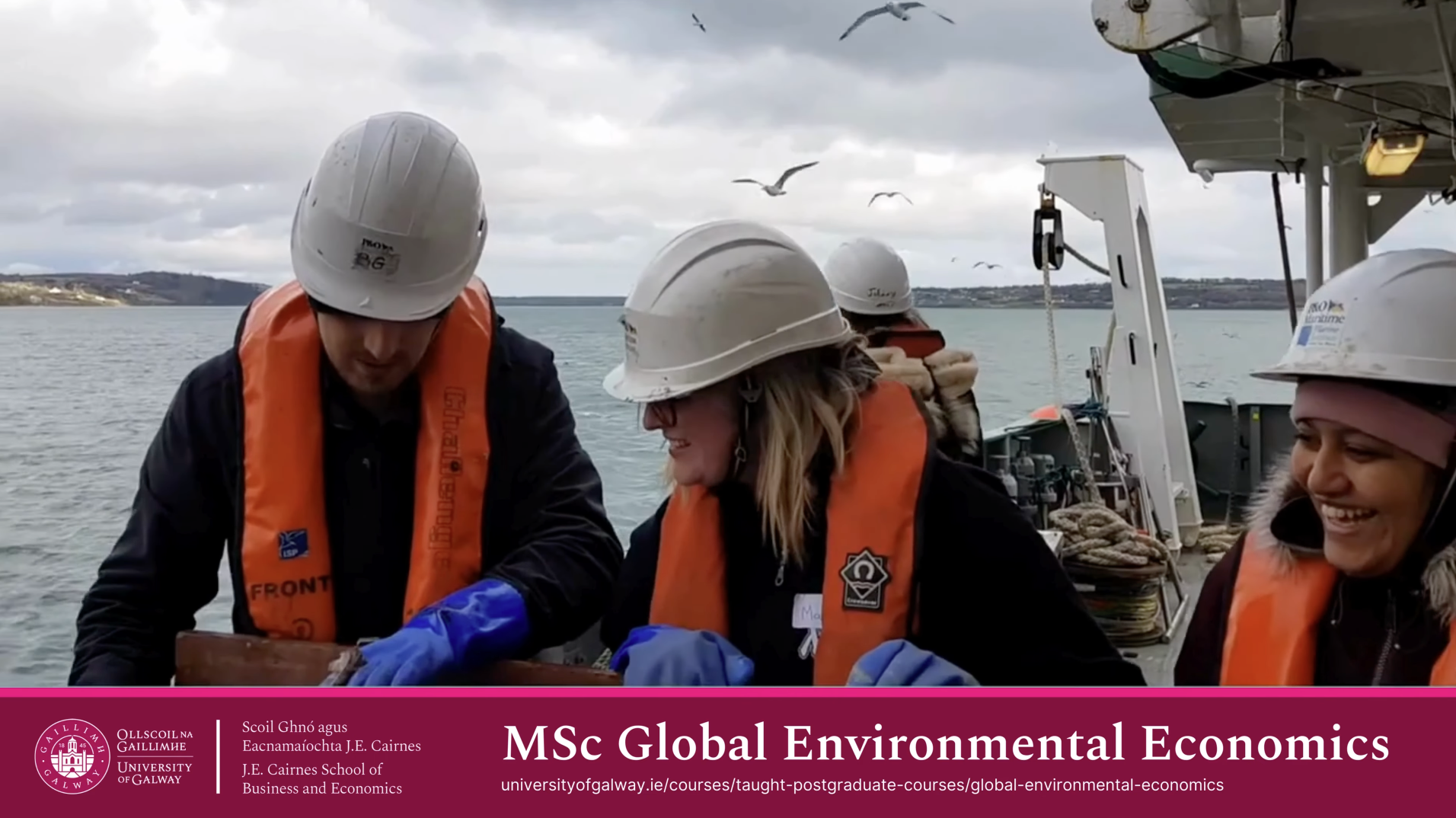
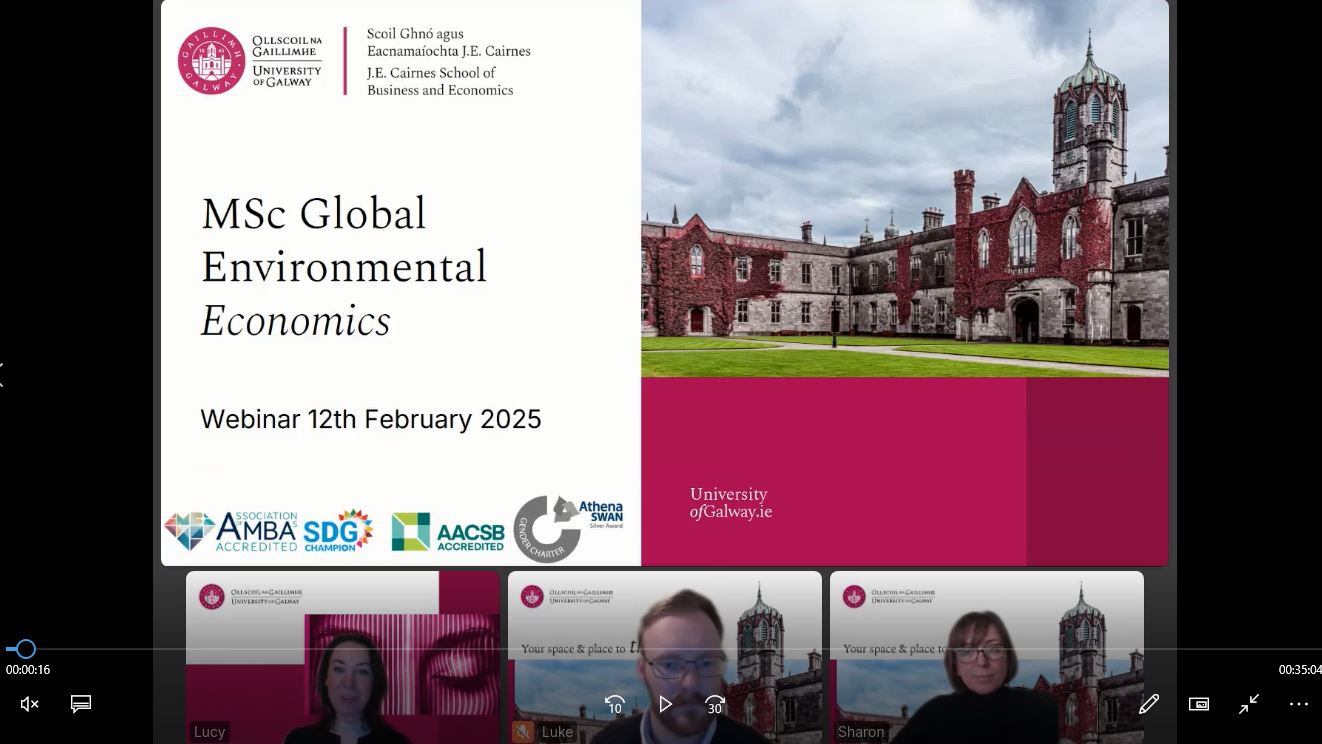



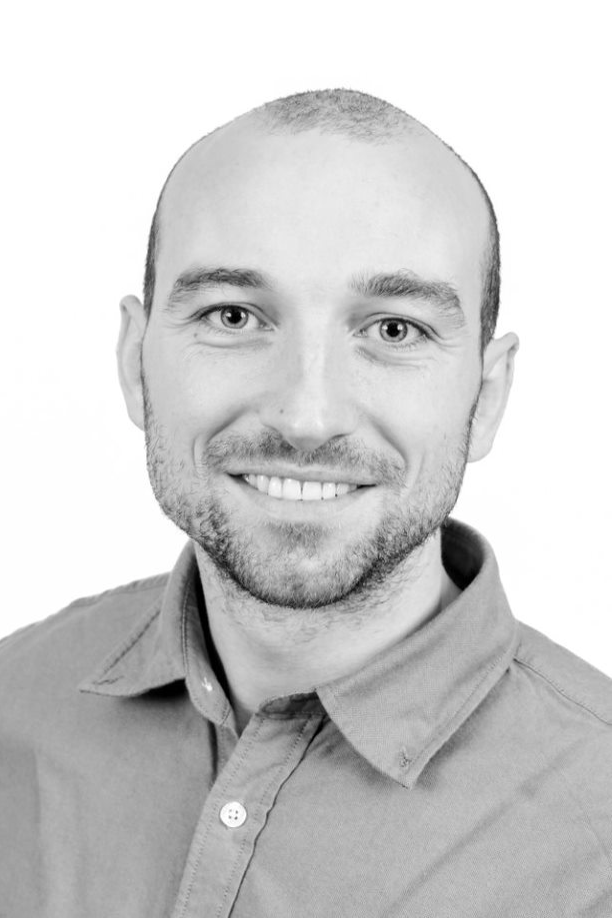
.png)
-(1).jpg)
